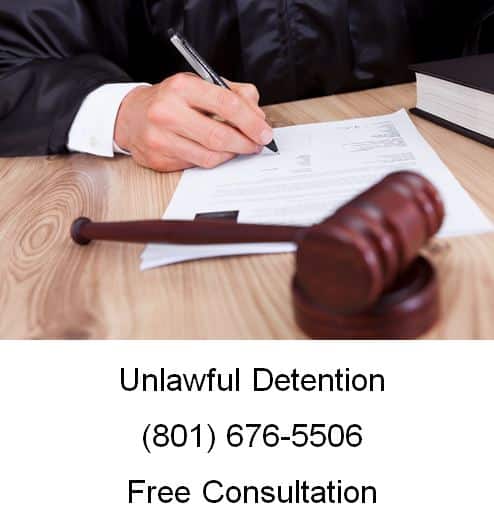Unlawful detention, also known as false imprisonment in some places, under Utah law is defined as a person, without legal authority, restraining or detaining an individual against his or her will.
While the definition seems clear at first glance, what constitutes “detention” might surprise most people. For the purposes of § 76-5-304, restraint could be something as simple as grabbing a person’s arm or preventing him or her from leaving a room.
Unlawful detention is often confused with kidnapping in Utah. Those crimes, however, are distinctly different. Moreover, the Unlawful Detention Statute states that a violation of § 76-5-304 is separate and the circumstances surrounding it should not constitute a violation of kidnapping, found in § 76-5-301.
Information on Unlawful Detention in Utah
- What are the Elements under § 76-6-304?
- Is the Unlawful Detention of a Minor Different?
- How is Unlawful Detention Penalized?
Elements of Unlawful Detention under § 76-6-304
To convict an individual of unlawful detention in violation of § 76-5-304, the State must prove the following elements beyond a reasonable doubt:
- that the actor knowingly or intentionally, without authority of law detained or restrained a victim;
- that the actor did so against the victim’s will; and
- that the circumstances did not constitute a violation of any of the following:
- child kidnapping, §76-5-301.1;
- kidnapping, §76-5-301; or
- aggravated kidnapping, § 76-5-302.
Being convicted of unlawful detention is a serious offense in Utah, however, the unlawful detention of a minor is subject to enhanced consequences under Utah law.
Elements of Unlawful Detention of Minor
Under § 76-5-304 of the Utah Criminal Code, an individual may also be convicted of the unlawful detention of minor, if the prosecutor proves the following elements beyond a reasonable doubt:
- the actor knowingly or intentionally, without authority of law, exerts influence over the victim
- the actor does so with the intent to cause the victim to remain with the actor;
- the actor’s intent is for the victim to remain with him or her for an unreasonable period of time under the circumstances;
- the actor is at least four or more years older than the victim; and
- the circumstances do not constitute a violation of one of the following:
- kidnapping under § 76-5-301;
- child kidnapping under § 76-5-301.1; or
- aggravated kidnapping under § 76-5-302.
Utah law defines “against the will of the victim” in the context of the unlawful detention of a minor as acting without the consent of the legal guardian or custodian.
Moreover, for the purposes of this Statute, a victim that qualifies under § 76-5-301(2) is any of the following;
- a minor who is 14 or 15 years of age; or
- a mentally incompetent person.
Penalties for a Unlawful Detention Conviction
In Utah, the unlawful detention of a person or minor is classified as a Class B misdemeanor. Under Utah law, class B misdemeanors are punishable by up to six (6) months in jail and up to $1,000 fines.
Similar Claims
There are multiple types of claims, both civil and criminal that are very similar to unlawful detention.
Kidnapping
– § 76-5-301 – involves unlawfully restraining an individual against his or her will. Where unlawful detention is a Class B misdemeanor offense, kidnapping is a felony. Moreover, unlawful detention is a lesser-included offense of kidnapping.
Wrongful arrest
– § 76-6-604 – involves a law enforcement officer or authorized retailer detaining a person against his or her will under the belief of some wrongdoing. Wrongful arrest under Utah law may subject a person to civil liability.
Free Consultation with Unlawful Detention Lawyer
If you’ve been charged or arrested and you need help, call Ascent Law for your free consultation (801) 676-5506. We want to help you.
8833 S. Redwood Road, Suite C
West Jordan, Utah
84088 United States
Telephone: (801) 676-5506
Additional Utah Legal Resources
What Can Someone Expect After Getting Out of Jail
How Does a Prior Arrest or Conviction Impact a Criminal Case?


